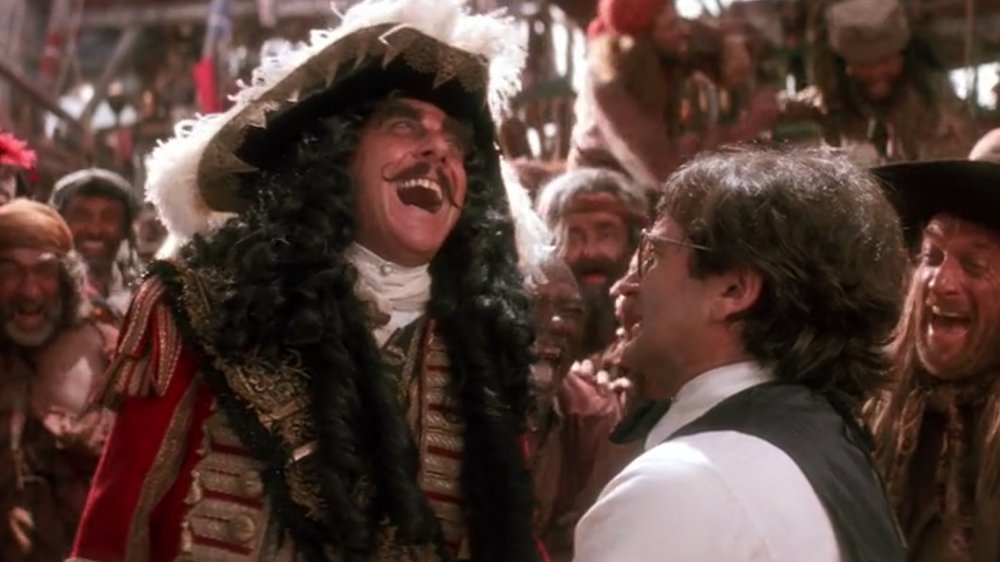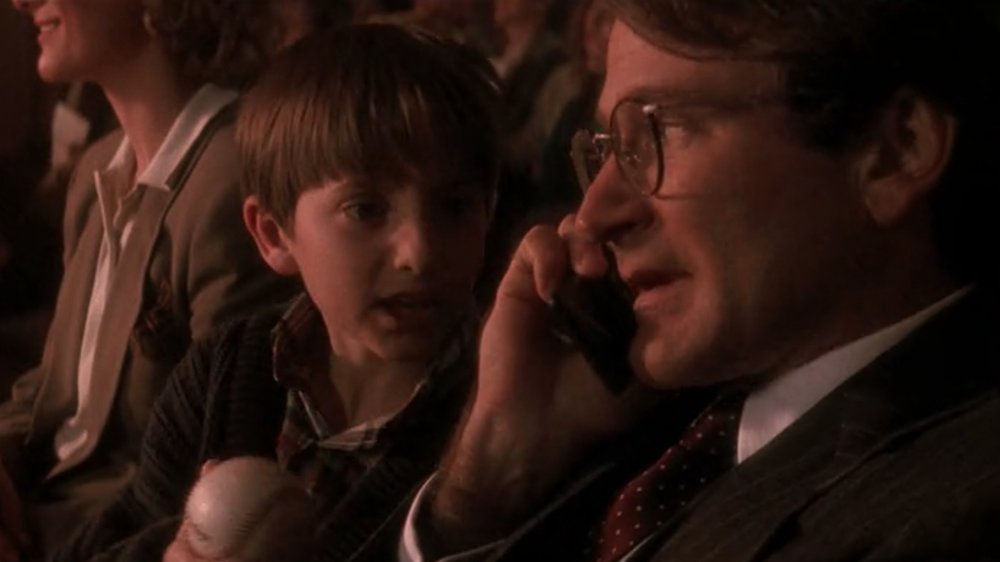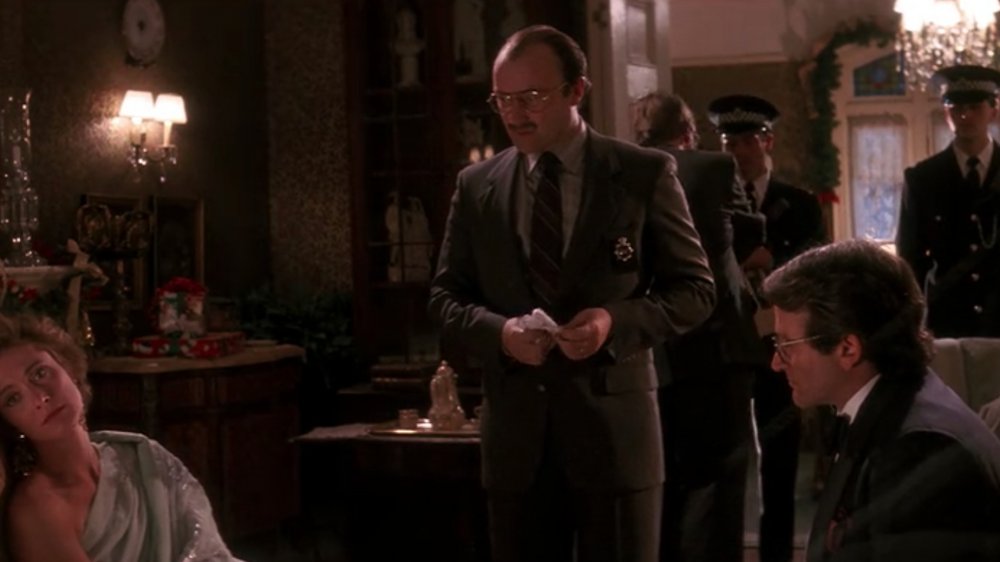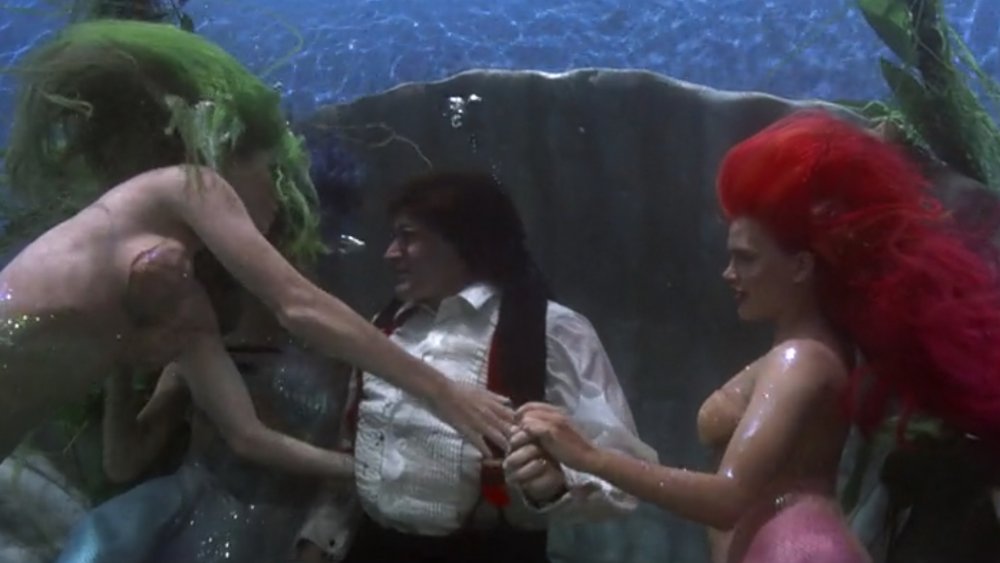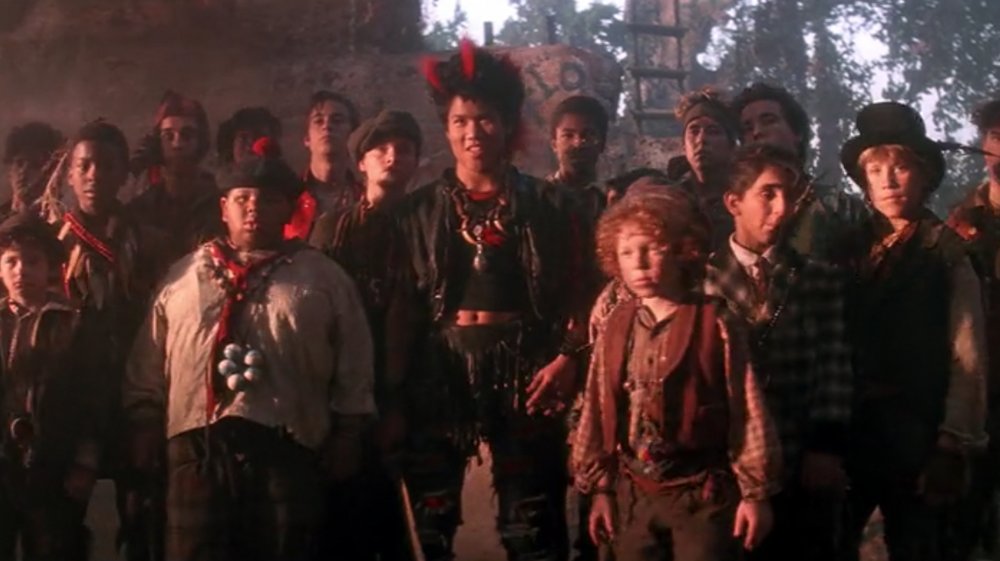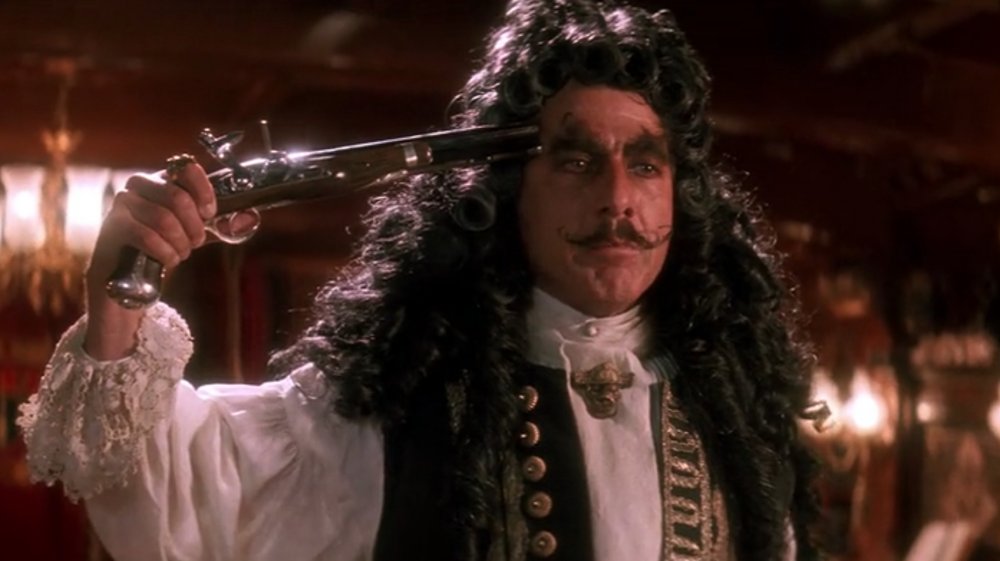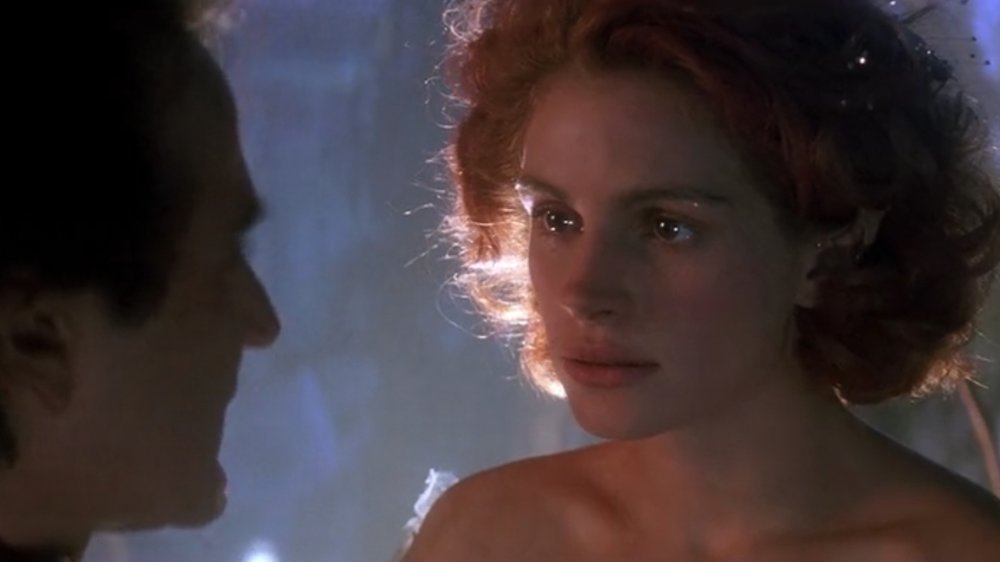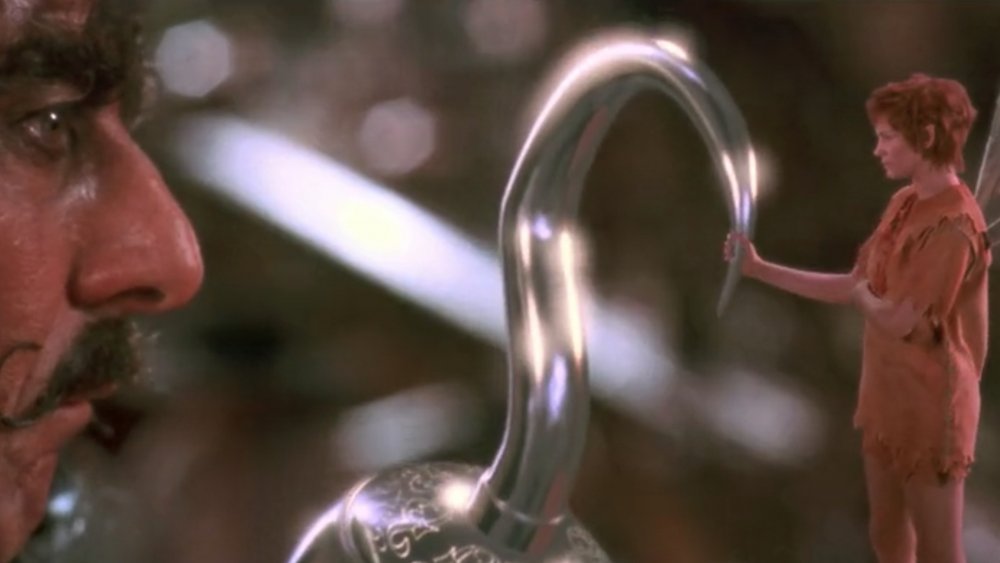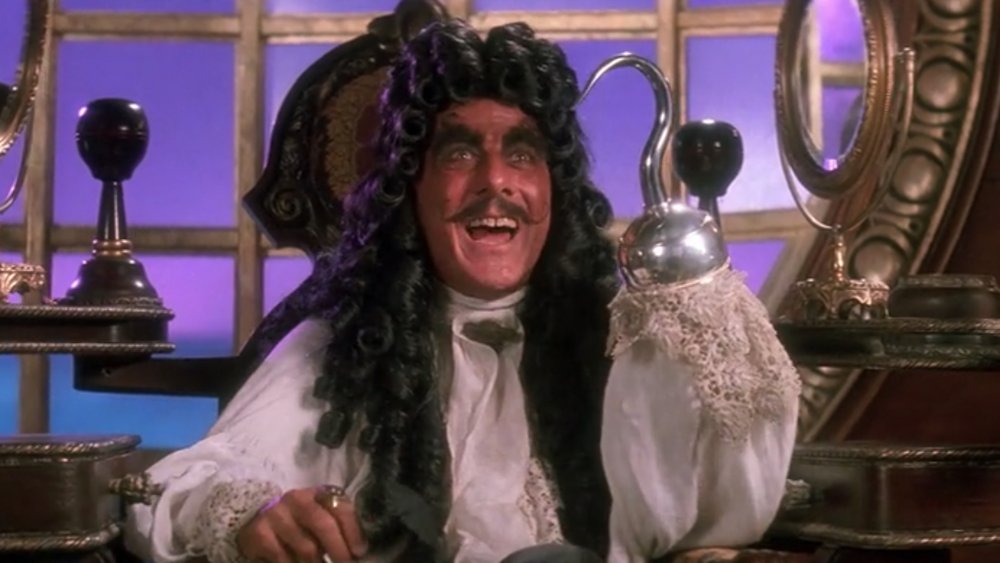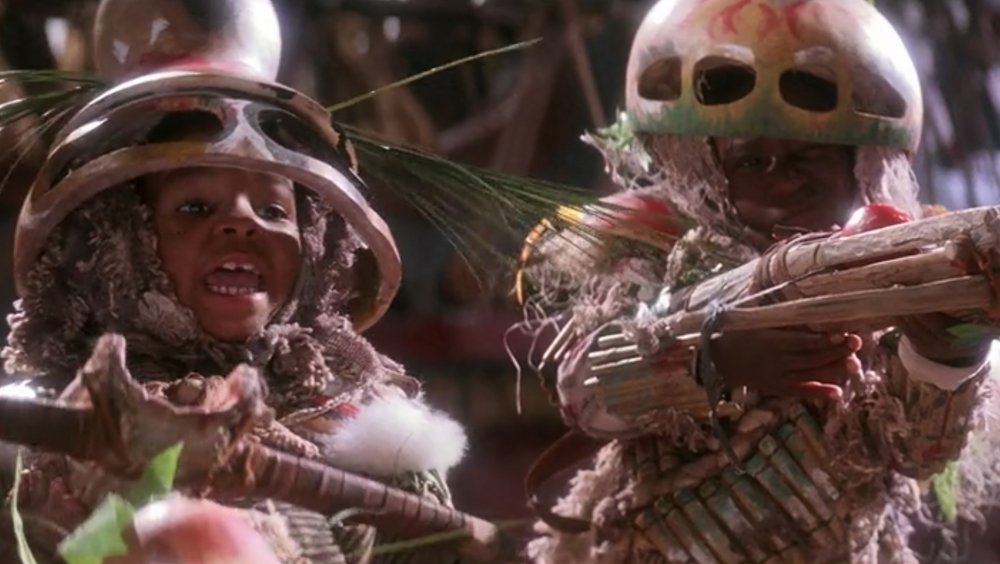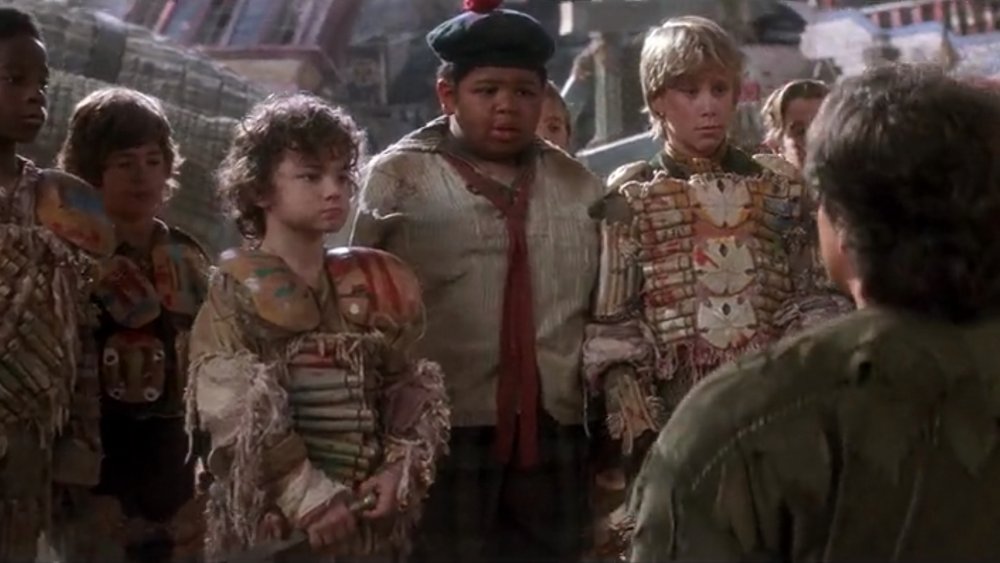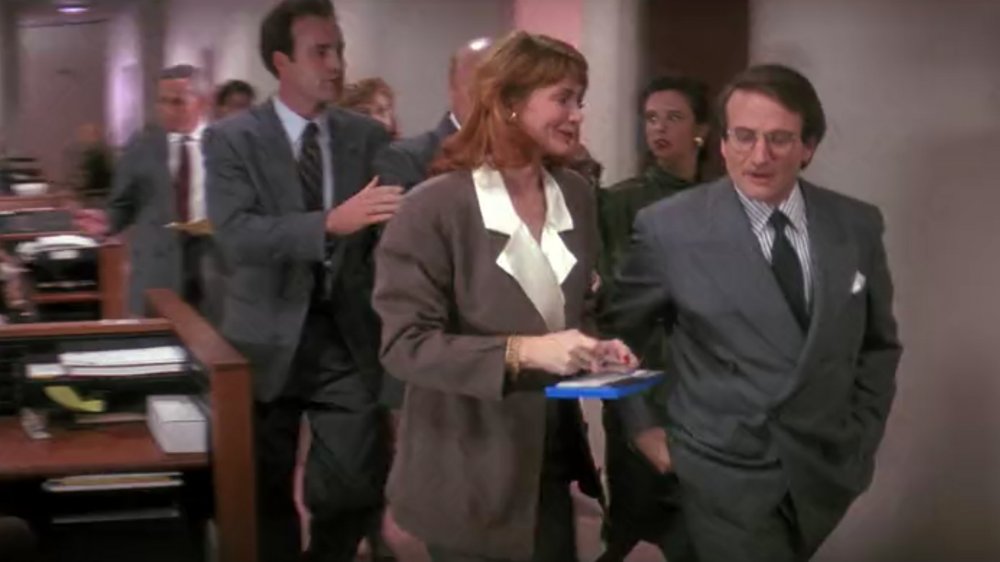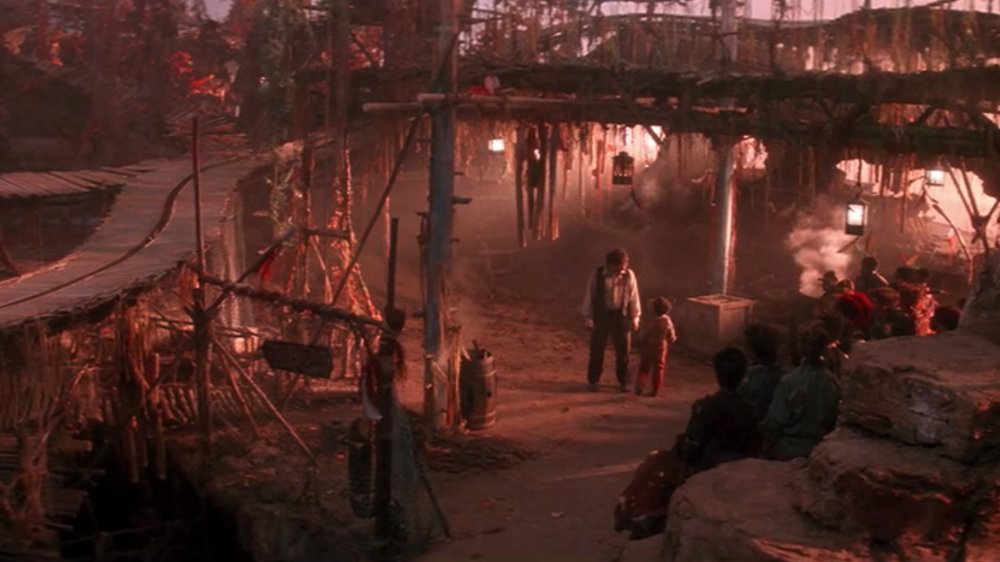Things Only Adults Notice In Hook
Father Time is an undefeated foe, despite the fact that so many despise him. Though we may assault him with expensive cosmetics, punishing fitness regimes, and all manner of positive thinking, he stays upright. That's what makes the story of Peter Pan so potent: What if there was a place beyond time, where childhood reigned forever? What if, as the mermaids, fairies, and Lost Boys entreat, you never had to learn to do your taxes, keep track of your cholesterol, or grapple with advancing mortality? Never grow up, they whisper, and whether we're watching the Disney's Peter Pan or reading J. M. Barrie's 1911 novel, Peter and Wendy, we listen.
Steven Spielberg's Hook turns that premise inside out. Peter Pan, now Peter Banning, is a corporate lawyer, having left Neverland behind to marry Wendy's granddaughter. He has a wife, two kids, no imagination, and, we can only imagine, a mortgage. When his children are kidnapped by Captain Hook, however, he must return to Neverland — but as someone who talks on his cell phone through stage productions of his own story, he has a long way to go.
To the younger viewer, Hook is a movie about adventure, pirates, and spiked mohawks (and one of the best pirate movies out there, too). To anyone Peter Banning's age, however, it's not quite that simple. From inept authorities to mid-life crises, here are things only adults notice in Hook.
Peter Banning is a self-involved jerk
Hook might take place in 1991, but it doesn't feel as far off as you might think. Peter Banning, for example, played by a superb Robin Williams, is utterly glued to his cell phone and just as rude about it as the world's most obnoxious movie-texter. The film begins with him, his wife, and his son attending a school production of Peter Pan, in which his daughter plays the titular role. As Wendy presses a thimble into Peter's palm, he answers a phone call and proceeds to schedule a meeting. He doesn't whisper, leave the room, or cut it short. He talks, hunched in his chair, like there aren't rows of eager parents straining to hear their kids over his workaholic babble.
But his self-involvement isn't just irritating — it's rubbing off on his kids. Shortly after the play, Peter's son, Jack, establishes himself as the worst possible child to be trapped on a plane with when he repeatedly slams a baseball into the cabin's ceiling. Peter tries to get him to stop, but Jack, angry with his father for missing his baseball game, continues. Eventually, he smashes a window, triggers the oxygen masks, and doesn't seem all that sorry. Peter isn't just a jerk — he's a terrible role model.
The police should be more worried about two missing children
When Peter's children go missing while the family visits an elderly "Granny Wendy" in London, he quickly involves the authorities. Considering the kids' absence and the ransacked state of the home they were snatched from, one would assume the police to be frantic with worry. But no: The authorities basically shrug off child abduction as a possible prank. So what if there are clear signs of breaking and entering, a ransom note, damage to the home, and distraught family members? It's kids, they shrug. Kids do weird stuff.
The audience, Wendy, Tinker Bell, and eventually Peter know where the kids really are — whisked away by Captain Hook to the magical realm of Neverland. And sure, as savvy viewers, we know the police have to ignore the missing kids so the main characters can focus their attention on going back to Neverland. But still: In a part of London as nice as Wendy occupies, shouldn't they have kicked up more of a fuss?
About that mermaid scene...
Unable to save his kids, Peter is laughed off a plank and falls into the water. On the verge of drowning, three gorgeous, glittery mermaids come to his rescue ... by smooching him. Okay, sure, they were giving him air to survive underwater. But let's be real: In quick succession, they each kiss him with a passion that pushes against the movie's PG rating.
Kissing these three scantily-clad beauties is, of course, one of many steps Banning takes towards regaining his memories of being Peter Pan. But really, that just makes the sensuality of the scene more suspect. Peter Pan is, of course, a child, and famously unable to return Wendy's infatuated feelings in incarnations dating back to Barrie's original novel. As Hook's first scene recounts, when Wendy says she's going to give Peter a kiss, he holds his hand out, expecting a trinket. Seductive mermaids wouldn't hold much appeal for him — they're only interesting to grown-up Peter Banning. And presumably, certain adults in the audience.
The Lost Boys' society is heartbreaking
A world without parents and the rules they create is a powerful childhood fantasy. Peter Pan's band of Lost Boys are an unforgettable part of his mythos as a result — but to any adult watching Hook, the ragtag band of orphans isn't anything but sad.
Sure, there are charms to their way of life. Having no food, for example, poses no problem to the Lost Boys — the power of imagination makes anything possible in Neverland, and so all they need to do is pretend they have food, and it appears. And yes, they're adequate builders who have managed to create a sprawling tree fort to act as their home. But without adults to look after them, they haven't mentally developed far beyond survival, aggression, and frivolity. It is heartbreaking to see them spring to anger, especially as they're equipped with weaponry. They live, as Peter quips, in "some sort of Lord of the Flies preschool." They might want to live forever in Neverland, but what they desperately need is parental supervision and a safe home.
Captain Hook has lost his marbles
Tootles, the Lost Boy first encountered as an elderly man in Wendy's home, has literally lost his marbles. When Peter returns them to him by the end of the movie, they prove to be the cure to his confusion and malaise, and allow him to return to Neverland. Captain Hook, in contrast, is not so lucky: He's lost his mind, and there's no toy that can bring it back.
Captain Hook has, in the years since Peter's departure, fallen apart. He appears to be suicidal and even points a gun at his head. He craves attention and will go to great lengths to receive it. He wants, above all, to finally slay his sprightly foe. This, he believes, will fill the sucking void within his soul.
Now, Hook isn't doing all that badly, all things considered. His quarters are luxurious, and one might imagine he'd be happy without Peter around to mess up his plans. But the midlife crisis comes for us all, and he, like so many at that time of life, longs for the past. When Peter returns, he even lets him train, in the hopes of a real fight. Captain Hook wants to battle the Peter Pan because, quite frankly, that was when he was most challenged and happy in life. But as any adult can tell you, that's only a band-aid applied to a grievous wound. If only Neverland had therapists.
Tinker Bell is obsessed with Peter Pan
Tinker Bell, played by a pitch-perfect Julia Roberts, is, frankly, obsessed with Peter. His years of absence have done nothing to change this — in fact, they've only intensified her ardor. She knows, of course, that Peter is married and has two kids, but that's never stopped her before. When Peter first kissed his wife, in fact, she was watching, heartbroken, from outside the window. The intervening decades have done nothing to dull this ache — or the love that fuels it.
It's devastating to watch Tinker Bell pine. But her unrequited love isn't merely tragic — it is poisonous in a way many adults will recognize. Tinker Bell harbors vindictive jealousy toward Moira that is genuinely cruel, and has cut herself off from life in her everlasting paradise for want of one boy's attention. Luckily for Tink, she gets the closure she's been longing for when she kisses Peter at last. She admits she'll always love him — but grown-up viewers hope those are words she'll look back on and laugh at, years later. Live your best life, Tink, even if it doesn't include Peter.
Hook's plan to get back at Peter Pan has no juice
Captain Hook and Smee's revenge is, in concept, simple: They plan to make Peter's kids love Hook and hate their dad. This epic betrayal is supposed to take place over the span of three days, helped along by the wacky way time functions in Neverland. The residents of this universe tend to forget their past fast — even if it includes their dad.
Peter has, of course, provided Hook with some killer manipulation material. Hook can't get Maggie to turn against her father, but Jack, smarting from the baseball game Peter blew off prior to their arrival in Neverland, is susceptible. Peter attended his daughter's school play, Hook croons, but not Jack's game. How is that fair? Hook even sets up a game of baseball for Jack, in which he hits a towering home run. The pirates proceed to lift Jack up and carry him around as the hero: They are, en masse, the father he's never had.
The plan works until Jack sees his dad during the battle and remembers how much he loves his father. Hook doesn't have any experience with children who have parents, after all — he has no idea how durable that bond actually is. Peter hasn't always done right by Jack, but the love is there and cannot be broken be a mysterious stranger with a pirate ship of playmates.
Hook has no reason to let Peter Pan leave to train in the first place
After countless years, Captain Hook finally comes face to face with his enemy. Peter is no longer a spry, sword-swinging kid — he's a dorky lawyer who can't even fly. These are clear advantages for Hook, who has longed for nothing but Peter's demise. And yet he does not take advantage.
There is a certain sense to this. Peter's not at all what he used to be, which will render the victory gained over him less sweet than Hook would like. Hook has, after all, been waiting for decades to get his revenge — what's a few days more? Instead of vanquishing Peter right then and there, he makes a deal with Tinker Bell and allows Peter to leave so he can train for the final battle.
These characters know how Neverland works — it's a magical place where nearly anything is possible. Eventually, Peter regains his youthful powers and defeats Captain Hook. How did Hook not expect this? Sure, he wants the satisfaction of a fair fight, but Neverland bends to the whims of hopeful children and there are, frankly, more of them than there are of his grown-up pirate crew. The numbers simply weren't there ... but then again, who's around to teach the denizens of Neverland math?
The war between Hook and Pan is literally a war between men and children
This is the part of Hook that's hardest for any adult to ignore: The fact that the war between Captain Hook and Peter Pan is a war between men and children. Many parents don't allow their kids to play bloody video games or watch action-packed movies — that's how dramatically kids and violence don't mix. So to watch Captain Hook kill Rufio, leader of the Lost Boys, is jarring.
Neverland is a different kind of place, of course, and the overall tone of Hook is upbeat. When one is a child, that's enough — if you got hung up on kids taking down adults in fiction, you'd have a lot less to enjoy. The thrill of that sort of battle, in fact, lies in its power disparity: A kid, just like you, takes down an adult who reminds you of your terrible teacher or dastardly dentist. But to an adult, watching Hook wage an actual war against a band of misfit Boy Scouts lands very different indeed.
Peter abandons orphans in a world with no rules
After Hook is swallowed by a crocodile and presumed dead, Peter and his children return home. But before they leave, Peter says goodbye to the Lost Boys and hands over his sword to Thud Butt, declaring him the new leader.
It's a great moment and meaningful farewell, but to an adult, it's hard not to notice Peter Banning abandoning a bunch of unsupervised children. Sure, they decide to stay in Neverland of their own free will — but they're kids. They'd eat ice cream for dinner every day if they could. Peter Banning is a parent and he's leaving behind the Lost Boys ... parentless.
Even in the real world, total strangers will get worried and ask unsupervised children where their parents are. This event typically takes place at people-packed supermarkets. Neverland, in contrast, is a world with pirates, no rules, and no adults. Admittedly, this logic kills the vibe and overall message of Hook, but the truth remains: The Lost Boys have no idea what they're doing and could really use someone to look after them. It won't be Peter, though, who leaves to take care of his own children.
Although he redeems himself, Peter Banning grew up to be everything he hated
The boy who wouldn't grow up does, eventually, grow up. He ignores his family. He's glued to his phone. He's a suit-wearing corporate dude. He yells at his kids, goes to a meeting instead of attending his son's baseball game, and even starts working the moment he gets to his vacation destination. By all measures, Peter grew up and became everything he once hated.
Throughout his time in Neverland, Peter remembers who he used to be and what he stood for — and realizes how far he's wandered from those early ideals. He leaves Neverland a grown-up, but with childlike imagination regained and a craving to start living life again.
Upon his return to the real world, Peter gets ready to yell at his kid for the window being shut, but surprises him with a changed and positive perspective — the window should always be kept open. This is promising indeed, but the adults in the audience have unique perspective on just how much he's changed — and perhaps how much they have as well.
Neverland is no place for kids
Neverland doesn't have parents or adult supervision. It's a place where kids have swords beneath their pillows. Captain Hook, a psychopath who longs to murder a child, lives there unimpeded. A war between men and children rages, as it has for years. By all measures, Neverland is a nightmare — but only adults will notice.
But it's not just the violence and unsafe tree construction. To never grow up is a tantalizing fantasy, especially to the young, but to a grown-up, it loses much of its savor. Sure, commuting is a pain, bills are never-ending, and to children, adults seem to always be in a bad mood. But growing up allows one to change. You can learn from your mistakes by growing, become a better person, and learn more about the world you inhabit. To live forever as a child in a treehouse seems fun at first, but after a while, the prospect is only depressing. You don't need to lose your imagination or your sense of whimsy, you only have to learn how to negotiate them differently. Neverland is fantastical, but it is also stagnant. To live and grow, instead, is an awfully big adventure — the biggest one of all.
